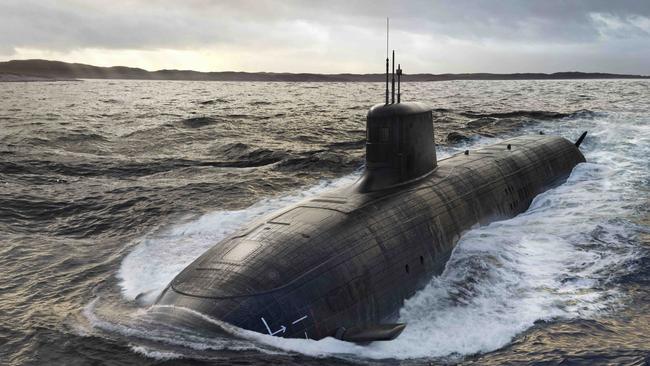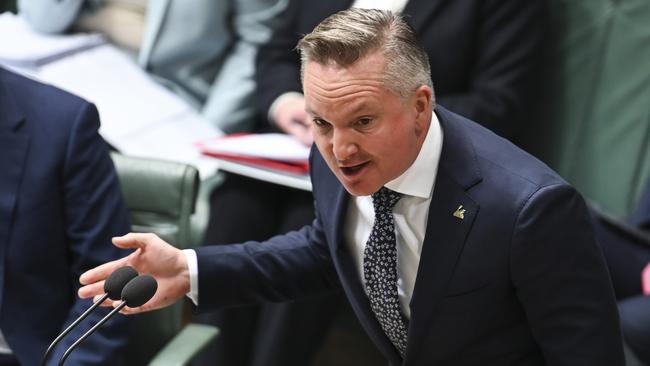Mixed signals on nuclear power stations will scuttle AUKUS submarine deal

AUKUS is Australia’s biggest military venture since World War II and the most complex manufacturing program we have ever embarked on, on par with the post-war automotive program and the Snowy Scheme.
AUKUS must succeed – the future of our nation and the stability and security of our region depends on it.
Putting this at risk is Anthony Albanese’s ideological opposition to the technology that lies at the heart of the AUKUS arrangement. That technology is nuclear energy. Nuclear reactors in submarines are smaller versions of the reactors used in today’s power plants and are similar in size to next-generation micro-reactors that soon will generate electricity in the US and Britain.
Both generate energy, although submarine reactors also enable propulsion. It is untenable for an Australian prime minister to oppose such technology.
Australia is to become one of only seven nations to operate nuclear-powered submarines under the AUKUS deal, joining world heavyweights the US, China, Russia, Britain, France and India.
But there’s one enormous difference between these nations and us: they all have civil nuclear energy industries and we don’t.
Between them, these nations operate 273 nuclear power reactors and are busily constructing 39 more, while the size of their workforces range from 64,500 in Britain to 200,000 in France. These thriving civil nuclear industries aren’t a coincidence – they are integral to successful nuclear ecosystems in these nations.
Foundational skills in engineering, physics and mathematics are required, whether in the civil nuclear industry or in the nuclear submarine industry. Indeed, as I learnt on a recent trip to the US, many of those working in the civil nuclear industry are former submariners. Creating lifelong career paths, including post-service job opportunities for submariners who are highly trained and skilled in nuclear technology is how it works there.

The Royal Australian Navy’s six Collins-class boats each require a crew of more than 40, compared with the nuclear-propelled Virginia-class that demands a crew at least twice that size.
Australia will need a committed and capable workforce to operate its own fleet of nuclear-propelled submarines, a task that will be more difficult in the absence of a civil nuclear industry.
It’s not just about submariners, though. Although we will need some industrial assistance from our AUKUS partners, making AUKUS a success also will require an expansion of Australian industry and skills, especially with hundreds of thousands of components needed to build and maintain the submarines.
We need to enhance our own sovereign manufacturing capability, and not just for a one-off procurement job but ideally for a broader mix of industries that will leverage nuclear technology for decades to come.
Yet, despite the obvious contradiction, Albanese continues to oppose nuclear energy. The problem is bigger than the Prime Minister, however. There’s also a split in the national security committee, which he chairs.
The national security committee is Australia’s peak decision-making body on matters of national security and consists of the government’s most senior ministers. If there were something on which these ministers might all align, you would think it would be AUKUS.
But these ministers’ public statements suggest otherwise: just consider the video by Climate Change and Energy Minister Chris Bowen last month, disparaging Australia’s competence in nuclear technology. His criticisms had the effect of undermining our standing among AUKUS partners. Bowen argued that Australia not only lacked the expertise to manage energy-generating nuclear reactors but also that it would take us decades to develop it. Yet, under AUKUS, Australia has assured our partners that we will achieve sovereign readiness to receive our first Virginia-class nuclear-powered submarine by 2032.
Bowen argued that Australia will struggle to store nuclear waste associated with nuclear reactors, ignoring the fact we already do. Australia has safely stored the nuclear waste from the Lucas Heights reactor since 1958.
Yet, under AUKUS, Australia has committed to manage all low and medium-level waste associated with the nuclear-powered submarines and to manage the permanent disposal of high-level spent fuel.
It is not in our national interest for such mixed messages to be sent to our AUKUS partners. In turning a blind eye to this issue, Albanese has allowed things to fester in Labor ranks.
Just last weekend, Queensland Labor’s state conference voted down a motion congratulating the Albanese government on AUKUS by 229 to 140. For AUKUS to succeed, the Prime Minister must lead.
To start, he should drop his opposition to nuclear energy, pull Bowen into line or remove him from the national security committee, and champion a pro-AUKUS motion at Labor’s national conference in August.
Ted O’Brien is opposition climate change and energy spokesman.






AUKUS will not succeed if the Australian government remains ideologically opposed to nuclear energy and the national security committee keeps sending mixed messages about our capability to manage nuclear technology.